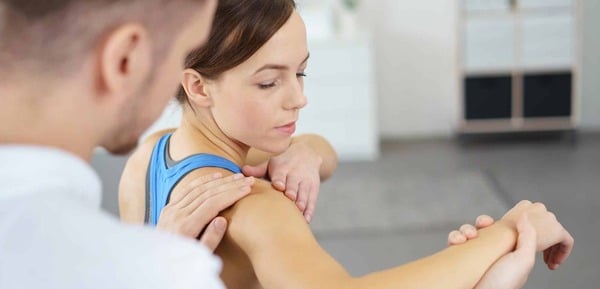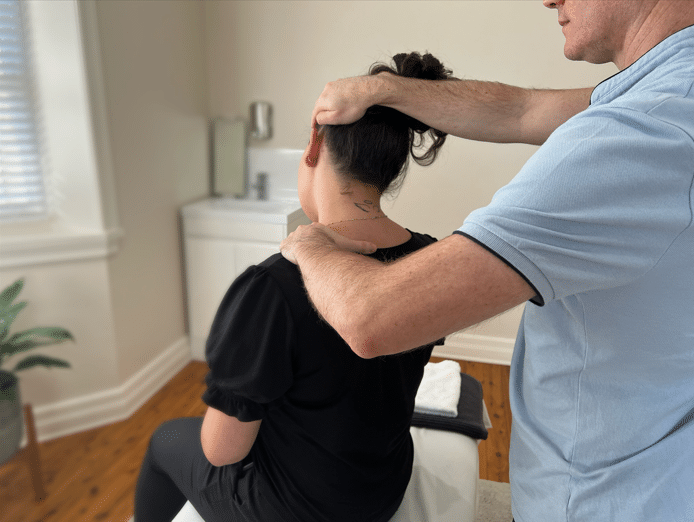- 02 9712 1736
- [email protected]
- 212 Great North Road, Five Dock, NSW 2046
- Open 7 days a week
Your shoulder is one of the most movable joints in your body. When you injure the ligaments in your shoulder, you lose your shoulder movement, and this can feel overwhelming. You might be wondering how long your recovery will take. The good news is that most shoulder ligament tears heal well with proper care. Let me help you understand what to expect during your healing journey.

Your shoulder ligaments are strong bands of tissue. They connect your shoulder bone to your upper arm bone and keep your shoulder stable. When an injury occurs, these ligaments can stretch or tear. Healthcare (doctor, chiropractor, osteopath or physiotherapist) providers grade shoulder sprains based on how damaged your shoulder ligaments are: Grade 1 sprain (mild): Very little or no tearing in your ligaments. Grade 2 sprain (moderate): Your ligaments are partially torn, but not all the way through. Grade 3 sprain (severe): Your ligaments are completely torn.
Your injury can happen one of two ways: suddenly from a fall or accident or it can develop slowly from repeated overhead activities. Athletes like tennis players and swimmers often face these injuries. Those of us who frequently perform tasks with your arms raised overhead also face a higher risk of injury.
Your recovery time depends on how severe your injury is. If you have a mild (grade 1) tear, you might feel better in one to two weeks. The healing period for a moderate (grade 2) tear can range from a few weeks to several months. If you have a severe (grade 3) tear, you might need surgery. After surgery, your recovery could take four to six months.
Your age, health, and how well you follow your treatment plan can also affect how fast you heal. Younger people usually heal faster. If you have other health problems, your recovery might take longer.
Several things can influence how quickly you recover. Your age plays a big role in healing speed. Younger people often heal faster than older adults. Your overall health also matters greatly. If you have diabetes or other health conditions, your healing might take longer.
The size and location of your tear affect recovery time. Younger patients without shoulder stiffness and with smaller rotator cuff tears had shorter functional recovery periods. If you had shoulder stiffness before your injury, the condition can slow your progress.
Your commitment to treatment makes a huge difference. Follow your physical therapy programme carefully, which speeds healing. Rest is also crucial during the early stages. If you neglect to let your body rest and recover, continual overuse may worsen the injury.
Most shoulder ligament tears start with conservative treatment. The most common treatment for shoulder sprains is the R.I.C.E. method: Rest: Avoid the activity that caused the injury. Try not to use your shoulder while it heals. Ice: Apply a cold compress to your shoulder 15 minutes at a time, a few times a day.
Physical therapy becomes crucial in your recovery. It helps restore your shoulder’s strength and movement. Your therapist will guide you through exercises designed for your specific injury. These exercises start gently and gradually become more challenging.
Should conservative treatment prove ineffective after several months, surgery may become necessary. You can go home the same day after most outpatient shoulder sprain surgeries. Recovery typically involves physical therapy to help restore complete functionality and range of motion to the affected joint.
Returning to your normal activities happens gradually. Your pain levels will guide much of this process. You’ll start with basic daily tasks first. Sports and heavy lifting come later in your recovery.
Studying the repair of partial rotator cuff tears, Rossi et al. found that 87% of patients (61/72) were able to return to sports and 56 patients (80%) returned to the same level they had before injury. Overhead athletes took significantly longer to return, with a mean time of 6.4 months versus 3.6 months for noncollision, nonoverhead athletes.
Your healthcare team will help you decide when it’s safe to return. They’ll test your strength and movement before clearing you. Don’t rush this process, as returning too early can cause re-injury.
Most people with shoulder ligament tears recover well. Your pain should gradually decrease over weeks or months. Your movement will slowly improve with proper treatment. Strength returns as your tissues heal and you complete physical therapy.
Some people worry about long-term problems. While some may have occasional stiffness or mild discomfort, most return to their normal activities. Following your treatment plan carefully gives you the best chance for full recovery.

Recovering from a shoulder ligament tear takes time and patience. Most people heal well with the right care and support. Your age, health, and commitment to treatment all affect your healing time. Most people recover well with proper care and can return to their normal activities. Our team is always here to help you every step of the way, so you can get back to doing what you love.

Scott has more than 20 years of clinical experience as a movement expert and musculoskeletal health professional. His thorough understanding of how pain affects your spine, joints, muscles, and total well-being is the result of significant academic study and many many years of clinical experience. Scott’s real interest in movement mechanics enables him to develop individualised care plans that summarise complex problems into clear, simple treatments, leading to quicker healing times. His friendly, attentive approach ensures that you not only comprehend but also feel supported throughout your treatment journey, allowing you to return to the things you like with restored confidence and vitality.


About
Five Dock Osteopathic & Chiropractic is located in Canada Bay, in Sydney’s Inner West. Servicing suburbs including Burwood, Croydon, Drummoyne, Five Dock, Haberfield, Concord, Abbotsford, Chiswick, Leichhardt, Wareemba, Russell Lea, Summer Hill, Strathfield.
Clinic hours
Monday, Tuesday, Thursday 7AM – 7PM
Wednesday, Friday 7AM – 6PM
Saturday 7AM – 2PM
Sunday 8AM – 2PM
Contact details